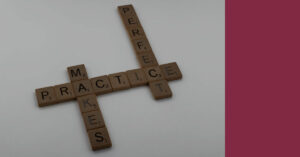This is part of a series of blog posts wherein members of the 6med team attach and comment on their own medicine personal statements. James shares his personal statement that helped him successfully gain an offer from UCL to study Medicine.
Please be aware that these examples are meant purely for the sake of inspiration, and should absolutely NOT be used as a model around which to base your own personal statement. UCAS have a rather strict system that detects plagiarism.
Successful UCL Medicine Personal Statement
First, take a read through this successful UCL personal statement and then we will break down each section and analyse it.
“For several months this year, I volunteered at a school for children with mental and physical disabilities. One particular student caught my attention, a violent and withdrawn boy. By patiently encouraging him to engage in activities through a toy caterpillar, I found a way to connect with him. The experience highlighted the importance and value of every human life, of having compassion for others, and of being aware of other people’s needs and problems aside from our own. Medicine is a lifelong endeavour; it is an opportunity for me to contribute to an expanding scientific field, as well as confront the physical, social and emotional challenges that face humanity.
As a naturally inquisitive person, my fascination with science has led to a profound interest in the human body. My wider reading included “The Music of Life” by Denis Noble, which gave me a better understanding of the physiological functions within the body and the interaction of genes with the environment, cells and organs. Further study of the applications of genetic engineering resulted in me writing a paper on the use of nanotechnology in Medicine. This discussed the relation of current scientific research to the management of various pathologies; the task required me to scrutinize secondary sources and gave me stronger analytical skills. Realising that this combination of science and practical undertaking appealed hugely, I sought some real world experiences to confirm my career choice.
Earlier this year, I undertook work experience in a Renal Unit of my local hospital. This gave me the opportunity to attend ward rounds and clinics, as well as observe dialysis and venous catheter insertion. Through talking to patients, the physical, and at times, mental fragility of some individuals surprised me. The empathy shown by the doctors inspired me deeply. A junior doctor recounted her tough experiences; there were instances where she was confined to a desk organising paperwork, and occasions where she didn’t get any sleep. However, her involvement with patients was satisfying, and seeing them progressively improve motivated her. From these experience, I appreciate how being a doctor can be gruelling, but also very gratifying. Above all, I realise the importance in having moral fibre, perseverance and humility.
Every Wednesday for four months I shadowed my local GP. Watching him give both medical and social advice with such understanding and clinical skill to people from every race, culture and faith made me realise the importance of primary care, good communication and careful allocation of resources.
As a concert pianist, I have gained experience in handling stress and performance anxiety. I perform at a local hospice every week and through successful piano competitions, I had the honour of playing at the Jacqueline De Pre Hall in Oxford. I enjoy conveying the emotion of a piece of music in a beautiful and hopefully profound way. As a school mentor and piano teacher for younger students, I developed skills in passing on information effectively and in listening to others with patience and respect. My experience in representing the school in badminton and hockey has given my stronger teamwork abilities, which I was able to apply in helping organise the school charity week, in which we raised £16,000. I hold positions of responsibility as a school prefect and founder of two societies, where I teach students musical theory and philosophy. Having also been a St John first aider for three years, I gained experience in making others feel comfortable in times of close contact and in assessing situations quickly and effectively. I also enjoy helping out at community events. Finally, I enjoy acting, and also performing magic; being able to instil wonder and joy in others is priceless.
I believe I have the humility, scientific acuity and empathy to become a committed doctor and to face the challenges ahead in my chosen career.”
Now, we’re going to take apart this personal statement and have a look at what makes it work.
Remember, though, we’re not going to teach a set formula, but instead, instil some general principles you can use when you’re writing your own.
Personal statements are ‘personal’ after all, so try not to put across things that don’t faithfully reflect your own experiences, understanding and individuality.
Need some extra guidance in your Personal Statement preparations?
Signing up to the Personal Statement Bundle means you’ll be guided by expert Medics who will help you write the perfect Personal Statement and provide unlimited redraft submissions.
Want to learn how to Write the Perfect Personal Statement? This bundle is the one for you…


UCL Medicine Personal Statement Analysis
“For several months this year, I volunteered at a school for children with mental and physical disabilities. One particular student caught my attention, a violent and withdrawn boy. By patiently encouraging him to engage in activities through a toy caterpillar, I found a way to connect with him.”
The first paragraph is often the hardest the write, and there are a number of ways you can go about it.
Whatever you write, always try to captivate the reader – although sometimes unavoidable, the first few sentences run a high risk of being clichéd. One possible way to sound more gripping is by richly conveying a personal experience, either as a volunteer or during your work experience.
Of course, this isn’t the only way: if you have a strong personal reason for studying medicine (which is actually quite rare among students) or just a strong interest in the sciences, make sure it comes across in the first paragraph, phrasing it in a more interesting and unique manner if possible; remember though, it’s important to always favour a more introspective and honest account of your experiences instead of something unrealistic and unnecessarily flamboyant.
“The experience highlighted the importance and value of every human life, of having compassion for others, and of being aware of other people’s needs and problems aside from our own.”
Following the purely descriptive account of the boy, the model statement goes on to reveal what the writer learnt from the experience.
This is an important point: it’s never about what you did, it’s about what you gained from the experience. Many students make the mistake of simply describing all the things they did during their hospital placement or whilst volunteering.
Instead, medical schools are looking for students that are able to reflect upon their experiences, and you’ll be doing this for the rest of your career as you input reflections onto your NHS ePortfolio.
“Medicine is a lifelong endeavour; it is an opportunity for me to contribute to an expanding scientific field, as well as confront the physical, social and emotional challenges that face humanity.”
Throughout the application process, medical schools are looking not just for an understanding of the medical course, but medicine as a career.
The writer here shows an awareness of medicine as a profession that requires continuous learning and growth, as well as an opportunity to do good in the world. Of course, there is some flowery language here, but the writer carefully chose this sentence to offer a convincing ending to the opening paragraph.
“As a naturally inquisitive person, my fascination with science has led to a profound interest in the human body.”
The next paragraph begins with one aspect of the writer’s desire to study medicine: scientific interest. Ultimately, no matter how much you want to care for people, studying medicine requires some degree of interest in the biological sciences, otherwise, you may as well serve people through a number of other fulfilling career paths, as a social worker, for example.
Note how this opening sentence sets the scene for the paragraph to come – it clearly marks a scientific theme. The language used is also richly descriptive, with words and phrases such as ‘naturally inquisitive’, ‘fascination’, and ‘profound’ adding colour to the sentence. Too often students fail to pick up a thesaurus and can end up sounding grey, unexciting and almost apathetic towards the things they talk about in some areas of their statement.
Never underestimate how the careful choice of language can add a new dimension to your personal statement.
“My wider reading included “The Music of Life” by Denis Noble, which gave me a better understanding of the physiological functions within the body and the interaction of genes with the environment, cells and organs. Further study of the applications of genetic engineering resulted in me writing a paper on the use of nanotechnology in Medicine. This discussed the relation of current scientific research to the management of various pathologies; the task required me to scrutinize secondary sources and gave me stronger analytical skills.”
The next few sentences provide support for the natural inquisitiveness and scientific interest the writer claimed to have.
Wider reading isn’t always necessary, but rather a nice addition to more academic personal statements. It’s usually the case that students applying to the more traditional and research-orientated universities (Oxbridge, UCL, Imperial, etc.) offer a few sentences showcasing their interest in scientific research and topics outside of their science curriculum.
If do you want to include a book you’ve read, make sure you know what it’s about so that you can write a concise, perceptive description about it in your PS, just like the writer has done here. We would advise against emphasising A-level choices too much and focus on things you’ve read or done outside the curriculum; certainly avoid talking about how high your grades are as this is a prerequisite for studying medicine anyway.
If scientific research plays a lesser role in your reasons for applying to medicine, then dedicate more space for work experience, volunteering and extra-curricular activities.
Personal Statement Inspiration & Examples Articles
“Realising that this combination of science and practical undertaking appealed hugely, I sought some real world experiences to confirm my career choice.”
Flow is important when it comes to writing your personal statement – don’t make the mistake of making the act of writing your personal statement a listing exercise, like you would for a curriculum vitae.
There should be some hint of an underlying narrative or flow to your writing; in terms of structure, each paragraph should have some theme – in this model statement, the writer has a paragraph on science, hospital work experience and volunteering, for example.
If you’re a fantastic writer (and most of us aren’t), then you may have already put together a beautiful story of how you discovered your passion for medicine and feel comfortable not sticking with a more conventional structure. If you’re not a strong writer, then we recommend you make your personal statement very thematic and simply use nice ‘linking sentences’ that bring together different themes between paragraphs. For example, the writer here draws the scientific paragraph to a close and links to the next paragraph, which talks about work experience.
“Earlier this year, I undertook work experience in a Renal Unit of my local hospital.”
Your description of where and when you did work experience should be short and snappy. There’s no need to give the full name of the hospital, and as a quick writing tip, try to avoid starting sentences with ‘I’.
“This gave me the opportunity to attend ward rounds and clinics, as well as observe dialysis and venous catheter insertion.”
You should then move on to what you actually did, keeping the descriptions as concise as possible.
Remember, medical schools don’t care how many ward rounds you’ve been on or that you’ve even worked at a hospital (although hospital experience is rather important). What is important is that you explain the things you’ve picked up and realized as a result of your experience.
“Through talking to patients, the physical, and at times, mental fragility of some individuals surprised me.”
The writer here first demonstrates they took opportunities to speak to patients, which is one of the most important things you can take away from a hospital placement.
Medical schools want to know you’re able to communicate with real patients and reflect upon your conversations with them. In this case, the writer succinctly reveals a first-hand experience of how patients can be weak, fragile and utterly dependent on doctors and others to support them.
“The empathy shown by the doctors inspired me deeply.”
The writer then goes on to reflect on how the doctors treated these patients and offers one of the most important qualities needed in all doctors, that is empathy.
Note again how this sentence is phrased – it sounds more genuine and meaningful than a sentence such as ‘Empathy is important in doctors’, which is something a lot of students would write.
Always write about what you learnt and realized through your experiences in an authentic manner, it’s much more powerful than phrasing things in a way that suggests you’re just saying it to earn points.
“A junior doctor recounted her tough experiences; there were instances where she was confined to a desk organising paperwork, and occasions where she didn’t get any sleep. However, her involvement with patients was satisfying, and seeing them progressively improve motivated her. From these experiences, I appreciate how being a doctor can be gruelling, but also very gratifying.”
At the same time, you should also be aware that personal statements can be a checklist exercise, with medical schools scrutinizing every sentence you write in order to determine whether you understand what being a doctor is about.
One of the important things you should include is the realities of being a doctor. All too often doctors are over-glamourized by students in their personal statements, with some going as far as saying doctors are trained to deal with all complications, which clearly isn’t true.
Instead, dedicate one or two sentences to the less attractive side of medicine, as the writer has done here. Examples of areas you could talk about may include the stress of long hours or having to break bad news to patients. Of course, you don’t want to leave any negative sentences hanging, so tactfully counter them by adding on positives that more than make up for some of the downsides of being a doctor.
Are you feeling stuck with your Personal Statement?
Signing up to the Personal Statement Bundle means you’ll be guided by expert Medics who will help you write the perfect Personal Statement and provide unlimited redraft submissions.
Want to learn how to Write the Perfect Personal Statement? This bundle is the one for you…


We also have a ton of Personal Statement resources available on our Free Personal Statement Resources page. Our top guides to check out include:
Check out these articles and more to learn how to write an amazing personal statement!
“Above all, I realise the importance in having moral fibre, perseverance and humility.”
As you’ll come to realize when writing your personal statement, fitting everything you want to mention into 4,000 characters isn’t easy.
This model statement clearly makes sacrifices with the content it includes – in this hospital placement paragraph, only two main qualities are covered: empathy and the realities of being a doctor.
There is no doubt that the writer could have included much more – but it’s more effective to go into detail on one or two of the most significant themes, and then just list or briefly talk about other things that the writer picked up from his experiences. In a nutshell, you should sit down and have a think about which of the most important qualities you can and want to portray through your work experience, and sacrifice the less powerful content.
In terms of writing tips here, the writer uses the rule of three (and this technique is used throughout this model statement) when listing: this is a way of making things sound nicer, but also allows the writer to include more high-yield content.
“Every Wednesday for four months I shadowed my local GP.”
The writer starts a new and shorter paragraph here, and this is purely for the sake of clarity. Do avoid writing long paragraphs and aim to split them into organized chunks if possible.
“Watching him give both medical and social advice with such understanding and clinical skill to people from every race, culture and faith made me realise the importance of primary care, good communication and careful allocation of resources.”
Again, the writer doesn’t give much of a description of what he did at the GP surgery, and neither is there much space to do so. Instead, it is more important to reflect on what you learnt and realized through whatever experiences you have undertaken.
“As a concert pianist, I have gained experience in handling stress and performance anxiety. I perform at a local hospice every week and through successful piano competitions, I had the honour of playing at the Jacqueline De Pre Hall in Oxford. I enjoy conveying the emotion of a piece of music in a beautiful and hopefully profound way.”
The penultimate paragraph talks about the writer’s extra-curricular skills and qualities developed through such activities. Never just list a bunch of hobbies you do – instead, always reflect on how you’ve developed your skills, making sure the qualities and skills you talk about are relevant to a future career in medicine.
The writer here uses the word ‘profound’ again – as a writing tip, it is good practice to avoid using the same adjectives or verbs again or close to each other in a piece of prose; ‘powerful’ may be a more suitable word here.
“As a school mentor and piano teacher for younger students, I developed skills in passing on information effectively and in listening to others with patience and respect. My experience in representing the school in badminton and hockey has given my stronger teamwork abilities, which I was able to apply in helping organise the school charity week, in which we raised £16,000. I hold positions of responsibility as a school prefect and founder of two societies, where I teach students musical theory and philosophy. Having also been a St John first aider for three years, I gained experience in making others feel comfortable in times of close contact and in assessing situations quickly and effectively. I also enjoy helping out at community events. Finally, I enjoy acting, and also performing magic; being able to instil wonder and joy in others is priceless.”
It’s important to watch out in this section of the personal statement: many extremely talented students apply for medical school, and it’s easy to run the risk of sounding arrogant if the way you phrase things isn’t carefully considered. In fact, this is a risk for all stages of the application!
One way to avoid sounding arrogant is to talk about how you ‘developed’ your skills, opposed to you already possessing them. For example, there’s a subtle difference between ‘I was given the responsibility to be a school mentor due to my strong communication skills’ and ‘I’ve developed strong communication skills through being a school mentor’.
Although the difference is certainly subtle, it can give you a sense of being humble, especially if you have impressive traits.
“I believe I have the humility, scientific acuity and empathy to become a committed doctor and to face the challenges ahead in my chosen career.”
The ending of this model statement isn’t particularly novel and many personal statements finish with something similar. It is important though to have a closing paragraph that links together your principal themes and affirms your suitability for medicine: in this case, the writer chooses scientific acuity, empathy and humility to be his big three qualities; moreover, the writer also slips in a few other qualities expected in medics, emphasising a commitment and readiness to overcome the challenges that are sure to come in the future.
Although simple, short and nothing original, the content in the closing paragraph was carefully chosen – it does the job and most importantly leaves a positive impression, which is the aim of the game.
Need some extra guidance in your Personal Statement preparations?
Signing up to the Personal Statement Bundle means you’ll be guided by expert Medics who will help you write the perfect Personal Statement and provide unlimited redraft submissions.
Want to learn how to Write the Perfect Personal Statement? This bundle is the one for you…







